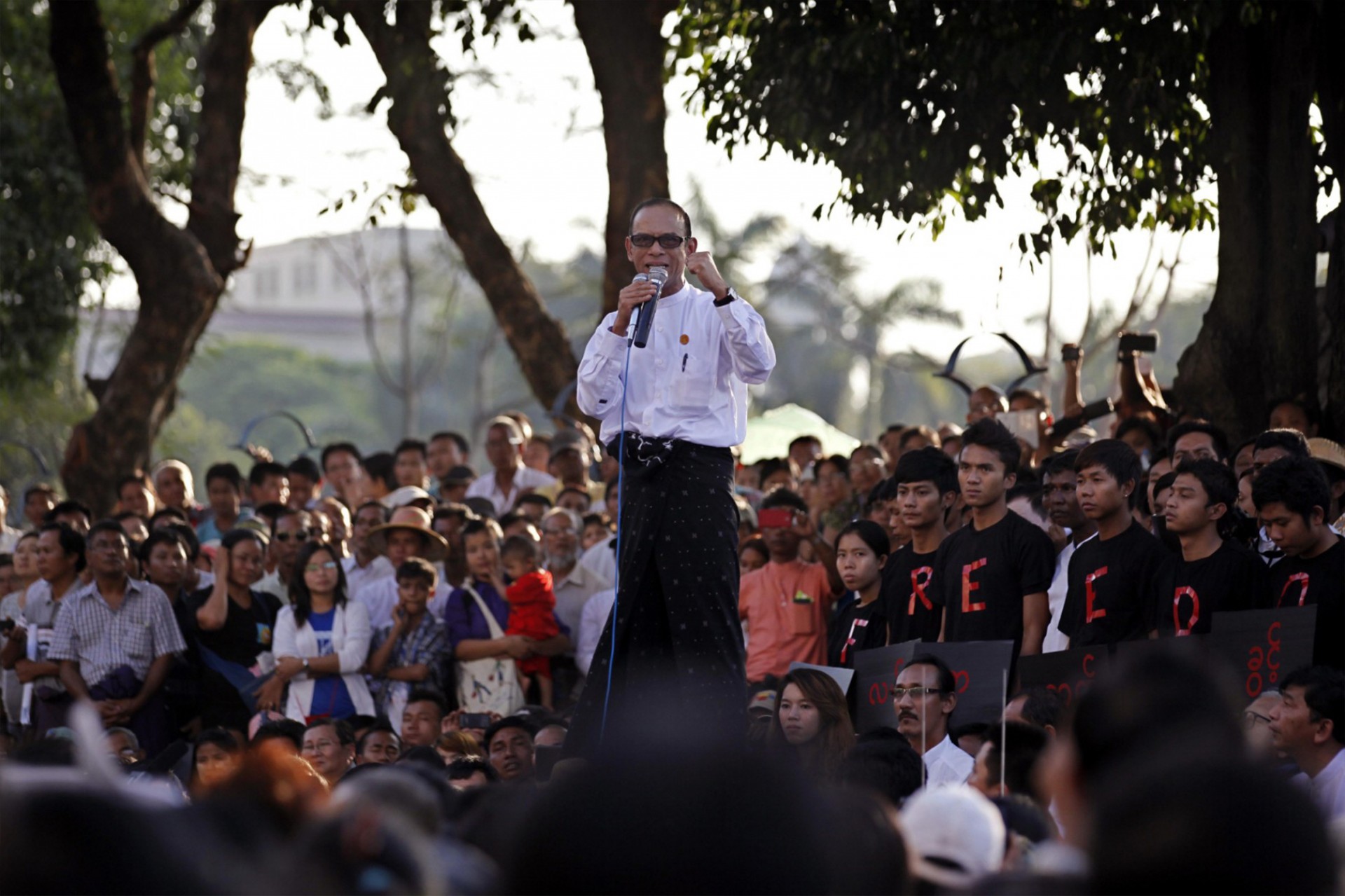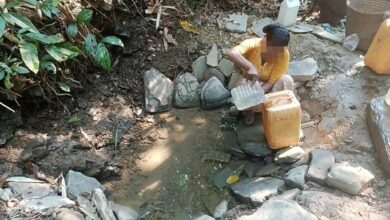
Mya Aye turned 56 on the day that Myanmar’s military junta sentenced him to two years in prison. But as an activist who first rose to prominence during the pro-democracy uprising that swept the country in 1988, he took the news in stride.
“I guess you could say that the prison sentence was my birthday present this year,” he said in a message sent to his family via his lawyer.
The sentence that was handed down on March 10 was the third that he has received since 1989, the year he was first detained for opposing military rule.
Released after eight years and then arrested again in 2007 during another period of unrest, he spent a total of 12 years behind bars by the time Myanmar’s military relaxed its grip on power just over a decade ago.
Then, even before the country’s generals announced on the morning of February 1, 2021 that they were once again in control, they came to get him.
CCTV images captured before dawn on that fateful day show him in the custody of junta soldiers, calmly walking away from his home with a single bag slung over his shoulder.
“We all warned him to move somewhere else when we started hearing rumours of a coup, but he was worried that the military would terrorise his mother, his wife, and his daughter if he did, so he decided to stay,” said his older daughter, London-based activist Wai Hnin Pwint Thon.

No reason was given for his arrest at the time, but he was later charged under Section 505c of the Penal Code for allegedly “inciting hate towards an ethnicity or a community.”
That charge, related to an email that he sent to a Chinese national in 2014 regarding Myanmar’s peace process, was clearly part of a vendetta that the country’s military leaders have had against him for decades for refusing to recognise their right to rule.
Unfazed by this latest bout of persecution, Mya Aye insisted that it wouldn’t have any effect on his political stance.
“It’s not strange for a politician to face hardships such as this in life. I will stand my ground no matter what sentence they give me,” he said in a message sent to Wai Hnin Pwint Thon before receiving the sentence, which was the maximum allowable for the alleged offence.
But even if her father seemed to accept his fate, Wai Hnin Pwint Thon couldn’t help but be saddened by the outcome.
“I just wanted him to spend his birthday at home with his family, eating a good home-cooked meal. It breaks my heart that we couldn’t give him that much, at least,” she said.

A man of many cats
Perhaps it is his relationship with cats that allows Mya Aye to retain a sense of freedom even inside a prison cell.
According to Wai Hnin Pwint Thon, her father has a habit of making feline friends whenever he is behind bars. With 37 cats of his own at home, having a few around even when he is separated from his family seems to be a source of real comfort.
In letters exchanged through his lawyers, cats always feature as a major subject of discussion between Mya Aye and his family, according to his daughter.
“Mom and Dad always come up with such weird names for them. One is called ‘Vermicelli’ because he has a funny, twisted face that looks like a tangled noodle,” she said.
Others have names based on their personalities, such as Mhone Kote (“Grumpy”) and Sayargyi (“Smartypants”), two of Mya Aye’s favourites.
Cats have also played a role in his friendships with fellow activists.

Min Ko Naing, another leader of the 1988 uprising, recalled that after they both found themselves in prison again in 2008, Mya Aye managed to smuggle two kittens to him in his cell to keep him company. He even gave them names—Lay Pyay (“Breeze”) and Lay Hnyin (“Flurry”).
But these names were deceptive, laughed Min Ko Naing, because they sounded calm and tranquil, whereas the two kittens were anything but. They did, however, help to give him some peace of mind at a time when Myanmar was still reeling from the effects of Cyclone Nargis.
“I just want to say how big of a heart that man has. He could be going through the hardest times of his life and he’d still remain soft and calm,” he said of his long-time colleague.
He also remembered how Mya Aye reacted to receiving a prison sentence of 65 and a half years under the former regime.
“When I said he would die before finishing that term, he just threw his head back and started laughing,” he said.
Min Ko Naing said he regretted Mya Aye’s latest sentence not just because of how it affected him and his family, but also because it deprived Myanmar of a real leader at a time when it needs his political vision more than ever.
“He knew we would need to choose this path and that’s why he dedicated a lot of his time working towards federal democracy,” he said.
For Min Ko Naing, who is a member of the National Unity Consultative Council, which brings together activists and politicians from many different communities to draft a new constitution, Mya Aye’s background as a Muslim would have made his contribution especially valuable.
“Imagine how motivating it would be to be able to hear Mya Aye’s words during such a revolution,” he said.
Health concerns
While Mya Aye may seem resigned to his fate, his friends and family remain deeply concerned about his well-being.
His health is far from good: In 2014, he had surgery for a heart condition that still troubles him, and more recently, he developed a life-threatening infection in a wound on his ankle.
It was only after he passed out that he was permitted to receive treatment at a hospital outside of Insein Prison, where he is currently being held.
Despite his doctor’s warning that he might even need to have his foot amputated if he didn’t get appropriate medical care, the military sent him back to the prison, and his wound still hasn’t healed completely, according to Wai Hnin Pwint Thon.
“The infection is still there and the foot is still inflamed, so he needs to get it checked regularly. However, he has once again been denied medical care,” she said.
As a member of Burma Campaign UK, a group that calls for international pressure on the Myanmar regime, Wai Hnin Pwint Thon is unable to return to her home country to see her father or the rest of her family.
She knows, however, that she is not alone in eagerly awaiting the day when he is finally freed.
Besides her mother and sister, their many cats are also anxious to see Mya Aye again, she said. Every night, they crowd around their front door whenever they hear approaching footsteps.
“He would always sing and call out his cats’ names when he came home from work in the evenings. He usually had some fried chicken for them, so even now, after more than a year, they can’t wait for him to come home,” she laughed.
“He surely would have bought fried chicken for his cats on his birthday,” she added.
Min Ko Naing also hoped his friend would soon be able to return to his loved ones in good health, and looked forward to the day when he would once again have a chance to play a vital role in shaping the country’s future.
“I hope his soft heart guides his way out of there. I hope the country won’t have to lose another precious citizen like him. I hope he will be able to return to work soon,” he said.



